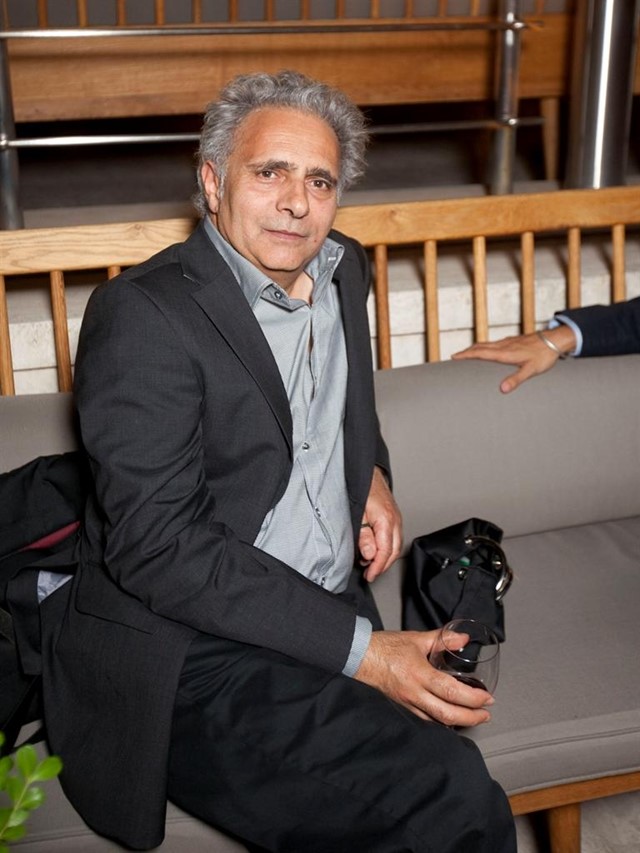Hanif Kureishi is an acclaimed author, playwright, screenwriter and essayist. Perhaps best known for the era-defining novel The Buddha of Suburbia, in 2008 he was listed in The Times’s top 50 greatest British writers since 1945. AnOther Magazine
Hanif Kureishi is an acclaimed author, playwright, screenwriter and essayist. Perhaps best known for the era-defining novel The Buddha of Suburbia, in 2008 he was listed in The Times’s top 50 greatest British writers since 1945. AnOther Magazine caught up with him to talk music, film, politics and literature.
Are you someone who is constantly writing?
I think you'll find that with all artists; it's always in the back of their mind, and sometimes even at the front of their mind. You make notes, you think about it a bit, you go for a walk and eventually something might occur to you that is interesting, and you’ll write it down. It's important for me as it makes me feel that I'm not leading an even more worthless and empty life than I'm already leading; that I'm doing something useful with my life.
You started off at the Royal Court Theatre in 1976. What for you is the difference between the novel, the stage and the screen as a creative space?
Well, with the movie over the play you're really only providing the first stage, and then you get involved with the director, the actor, and then there's the audience. With a novel you do everything yourself. There isn't anyone who then changes the work to make it complete, so a novel, in a sense, is probably more fulfilling.
You have said, ‘The world is funny and it’s only funny because it’s awful.’ Do you think humour is a way for writers and artists to deal with more difficult subject matter?
Yes, and humour sees things very quickly. It’s like taking an X-ray. When somebody says something humorous, it’s also because they recognise something about the world. It binds the audience together.
Music's very present in a lot of your writing, both implicitly and explicitly. Where does your interest in music come from?
There wasn't any other culture for us in the suburbs. My friends got involved in punk and so on because there wasn't a literary culture there, and you couldn't really work in the cinema. It was a sort of poor man's culture, and music was where, in my day – the 60s and 70s –, the most intelligent people were.
Did you ever want to be in a band?
I wasn't able to do that, but I wanted to tie together music, fashion, drugs, politics, race; all the things that were going on around that time in my life, and then that turned out to be The Buddha of Suburbia. Then there was the My Beautiful Laundrette screenplay that I did with Stephen Frears. Stephen's a director that helped me find my voice, because he could do the comedy and he could do the race stuff and he could do the sad stuff as well. He understood what I was trying to do and brought it out.
What, in your opinion, is the main difference in today’s socio-political landscape compared to the 60s and 70s?
Well I think radical Islam is a very big question for everybody and the issues that have come out of that to do with race, immigration, liberalism, the place of women and the relations between minorities. They’re still questions that need to be engaged with by all of us. All the things that came out of the fatwa against Rushdie, these are new questions. I think young people have become more conservative than they used to be. They’re concerned about the environment, eco- politics, which is of course very important, but I think the main difficulty is the position of women in the Muslim world. It’s all very well becoming an executive in the west, but it’s not much use to them.
Do you think have a responsibility toward them?
Yes, and a responsibility to ourselves, for our own integrity. An engagement with ideas – it’s very important.
You’re currently writing the screenplay for Aravind Adiga’s novel The White Tiger. What made you decide to take on that project?
I read the book and I thought, ‘I could do this,’ and it would probably work. And it’s a relief to be working on other people’s books; it’s quite hard having your own ideas all the time, so you need somebody else’s!
Do you have anything else planned for the coming year?
I’ve just started writing a novel. It’s about an old man and a younger man, and the younger man is writing the biography of the older man. It’s really about telling the truth of somebody else’s life, and what that would be and what that means, and your obligations to them, etc. I haven’t got very far with it, but I think there’s something in there that I can do.
Interview by Caroline Lever
